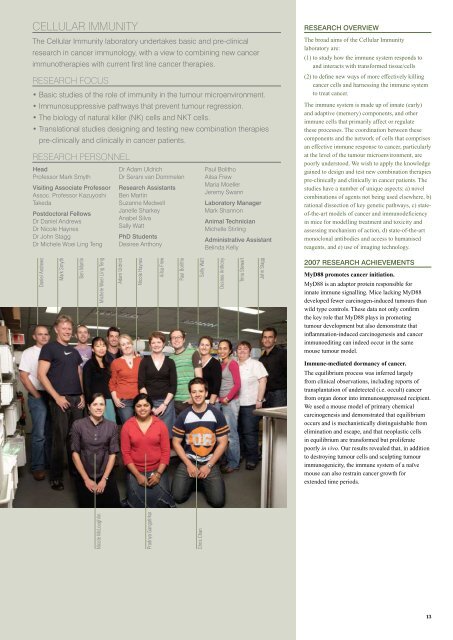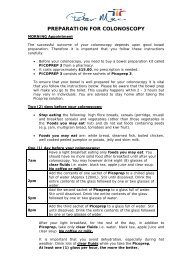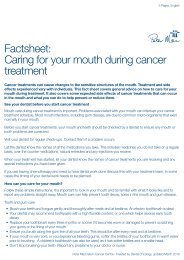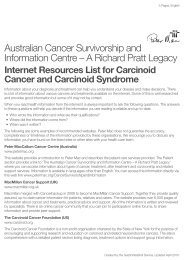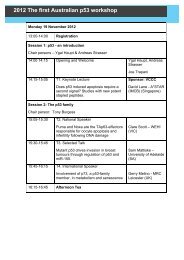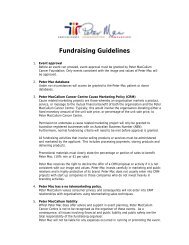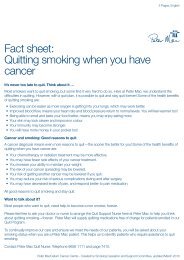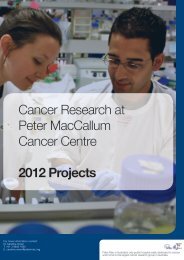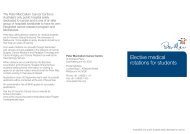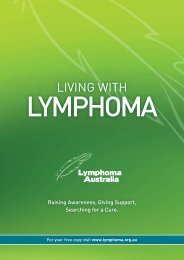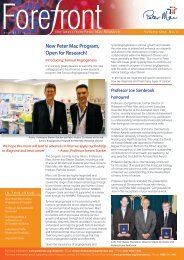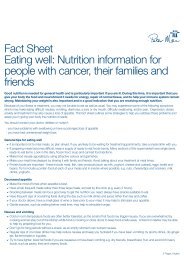RESEARCH REPORT - Peter MacCallum Cancer Centre
RESEARCH REPORT - Peter MacCallum Cancer Centre
RESEARCH REPORT - Peter MacCallum Cancer Centre
Create successful ePaper yourself
Turn your PDF publications into a flip-book with our unique Google optimized e-Paper software.
CeLLuLar iMMunitY<br />
The Cellular Immunity laboratory undertakes basic and pre-clinical<br />
research in cancer immunology, with a view to combining new cancer<br />
immunotherapies with current first line cancer therapies.<br />
researCh foCus<br />
• Basic studies of the role of immunity in the tumour microenvironment.<br />
• Immunosuppressive pathways that prevent tumour regression.<br />
• The biology of natural killer (NK) cells and NKT cells.<br />
• Translational studies designing and testing new combination therapies<br />
pre-clinically and clinically in cancer patients.<br />
researCh personneL<br />
head<br />
Professor Mark Smyth<br />
visiting associate professor<br />
Assoc. Professor Kazuyoshi<br />
Takeda<br />
postdoctoral fellows<br />
Dr Daniel Andrews<br />
Dr Nicole Haynes<br />
Dr John Stagg<br />
Dr Michele Woei Ling Teng<br />
Daniel Andrews<br />
Mark Smyth<br />
Ben Martin<br />
Michele Woei Ling Teng<br />
Nicole McLoughlin<br />
Dr Adam Uldrich<br />
Dr Serani van Dommelen<br />
research assistants<br />
Ben Martin<br />
Suzanne Medwell<br />
Janelle Sharkey<br />
Anabel Silva<br />
Sally Watt<br />
phD students<br />
Desiree Anthony<br />
Adam Uldrich<br />
Nicole Haynes<br />
Pradnya Gangatirkar<br />
Ailsa Frew<br />
Paul Bolitho<br />
Sally Watt<br />
Chris Chan<br />
Paul Bolitho<br />
Ailsa Frew<br />
Maria Moeller<br />
Jeremy Swann<br />
laboratory manager<br />
Mark Shannon<br />
animal technician<br />
Michelle Stirling<br />
administrative assistant<br />
Belinda Kelly<br />
Desiree Anthony<br />
Trina Stewart<br />
John Stagg<br />
research overview<br />
The broad aims of the Cellular Immunity<br />
laboratory are:<br />
(1) to study how the immune system responds to<br />
and interacts with transformed tissue/cells<br />
(2) to define new ways of more effectively killing<br />
cancer cells and harnessing the immune system<br />
to treat cancer.<br />
The immune system is made up of innate (early)<br />
and adaptive (memory) components, and other<br />
immune cells that primarily affect or regulate<br />
these processes. The coordination between these<br />
components and the network of cells that comprises<br />
an effective immune response to cancer, particularly<br />
at the level of the tumour microenvironment, are<br />
poorly understood. We wish to apply the knowledge<br />
gained to design and test new combination therapies<br />
pre-clinically and clinically in cancer patients. The<br />
studies have a number of unique aspects: a) novel<br />
combinations of agents not being used elsewhere, b)<br />
rational dissection of key genetic pathways, c) stateof-the-art<br />
models of cancer and immunodeficiency<br />
in mice for modelling treatment and toxicity and<br />
assessing mechanism of action, d) state-of-the-art<br />
monoclonal antibodies and access to humanised<br />
reagents, and e) use of imaging technology.<br />
2007 research achievements<br />
MyD88 promotes cancer initiation.<br />
MyD88 is an adaptor protein responsible for<br />
innate immune signalling. Mice lacking MyD88<br />
developed fewer carcinogen-induced tumours than<br />
wild type controls. These data not only confirm<br />
the key role that MyD88 plays in promoting<br />
tumour development but also demonstrate that<br />
inflammation-induced carcinogenesis and cancer<br />
immunoediting can indeed occur in the same<br />
mouse tumour model.<br />
Immune-mediated dormancy of cancer.<br />
The equilibrium process was inferred largely<br />
from clinical observations, including reports of<br />
transplantation of undetected (i.e. occult) cancer<br />
from organ donor into immunosuppressed recipient.<br />
We used a mouse model of primary chemical<br />
carcinogenesis and demonstrated that equilibrium<br />
occurs and is mechanistically distinguishable from<br />
elimination and escape, and that neoplastic cells<br />
in equilibrium are transformed but proliferate<br />
poorly in vivo. Our results revealed that, in addition<br />
to destroying tumour cells and sculpting tumour<br />
immunogenicity, the immune system of a naïve<br />
mouse can also restrain cancer growth for<br />
extended time periods.<br />
13


